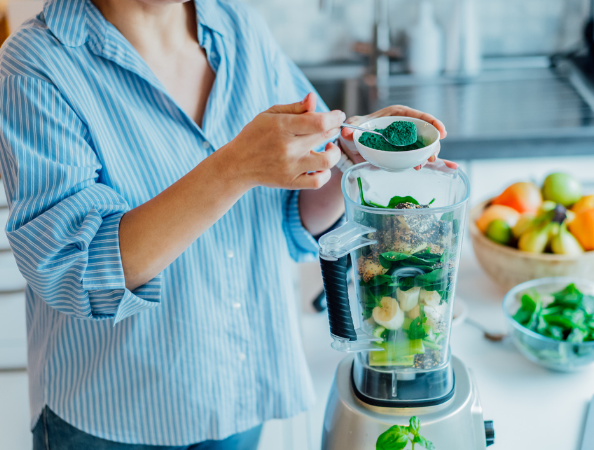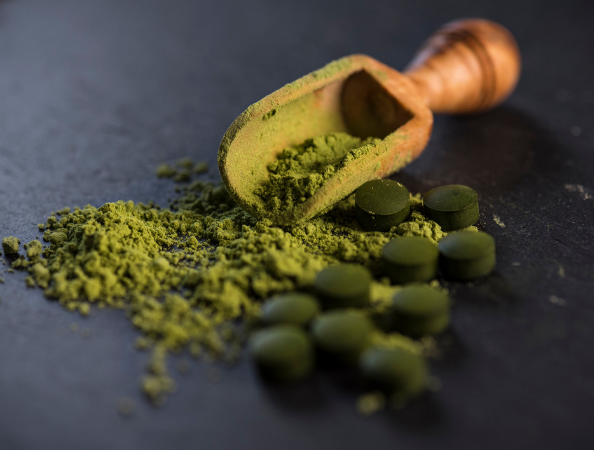This is how you can consume spirulina: the alternative to eggs with anti-inflammatory properties, vitamin B and omega-3

Spirulina is a type of microalgae characterized by its color that tinges any preparation. It's also considered an alternative to eggs due to its nutritional and emulsifying properties.
While it's not a direct substitute for all recipes, especially when it comes to this product, it's still an excellent source of protein that works very well within diets to strengthen the immune system.

Spirulina contains vitamins A, B12, B1, and B2. Photo: iStock
According to the Spanish Academy of Nutrition and Dietetics, this cyanobacteria provides vitamins, minerals, and antioxidants , especially in vegan diets, which reduces the risk of chronic diseases.
The organization also notes that blue-green algae is known by many for its effective weight loss, combating fatigue, improving eye health, and providing low calorie intake.
Forms of consumption “Fresh spirulina maintains its properties better and doesn't have the toasted notes that give it an earthy flavor, unlike powdered or tablet versions,” said Helena Martín, a researcher at CETT-UB in Spain.
Another common way to ingest this cyanobacteria is by spreading it on the surface of other products or incorporating it into substances such as yogurt, as it has a completely neutral taste.

Spirulina can be an alternative to eggs. Photo: iStock
According to the academic, microalgae are not just a supplement; they can be used to increase nutritional intake, which is why they are also often mixed with oil to make a kind of green mayonnaise.
As for the recommended amount, Martín indicates that only three to six grams a day are needed , but if it becomes a recurring element in the diet, the body eliminates what it doesn't need.

Spirulina is an excellent source of protein and vitamins. Photo: iStock
"By drying spirulina at low temperatures and turning it into fine noodles, this beneficial substance doesn't deteriorate," the researcher added, referring to the fact that these strands are perfect for complementing salads or soups.
Although microalgae are generally safe, it's always best to consult a health professional about how to consume them, especially if you are pregnant or breastfeeding.
DIGITAL REACH EDITORIAL
More news in El Tiempoeltiempo

%3Aformat(jpg)%3Aquality(99)%3Awatermark(f.elconfidencial.com%2Ffile%2Fa73%2Ff85%2Fd17%2Fa73f85d17f0b2300eddff0d114d4ab10.png%2C0%2C275%2C1)%2Ff.elconfidencial.com%2Foriginal%2F5b4%2Ff4f%2Fd38%2F5b4f4fd38375f7be6eba8ded0978a28c.jpg&w=1280&q=100)
%3Aformat(jpg)%3Aquality(99)%3Awatermark(f.elconfidencial.com%2Ffile%2Fa73%2Ff85%2Fd17%2Fa73f85d17f0b2300eddff0d114d4ab10.png%2C0%2C275%2C1)%2Ff.elconfidencial.com%2Foriginal%2F292%2F5da%2F725%2F2925da725a034128e2a0f42ce76b2cbe.jpg&w=1280&q=100)
%3Aformat(jpg)%3Aquality(99)%3Awatermark(f.elconfidencial.com%2Ffile%2Fa73%2Ff85%2Fd17%2Fa73f85d17f0b2300eddff0d114d4ab10.png%2C0%2C275%2C1)%2Ff.elconfidencial.com%2Foriginal%2Ffab%2F590%2F374%2Ffab590374bf9d3fc46abb536c71f91e4.jpg&w=1280&q=100)
%3Aformat(jpg)%3Aquality(99)%3Awatermark(f.elconfidencial.com%2Ffile%2Fbae%2Feea%2Ffde%2Fbaeeeafde1b3229287b0c008f7602058.png%2C0%2C275%2C1)%2Ff.elconfidencial.com%2Foriginal%2F9e4%2F932%2F627%2F9e4932627b68f568a5a1c48d15c99b21.jpg&w=1280&q=100)